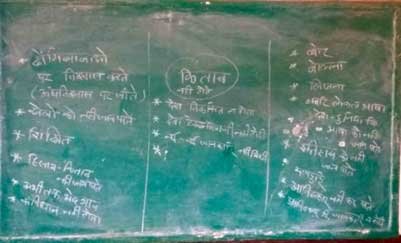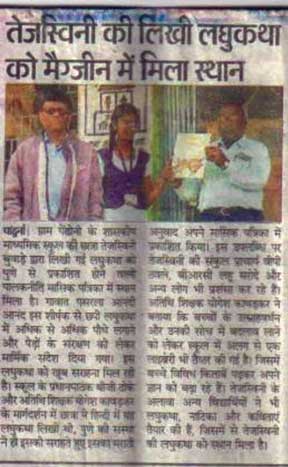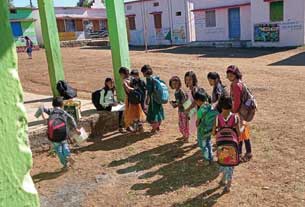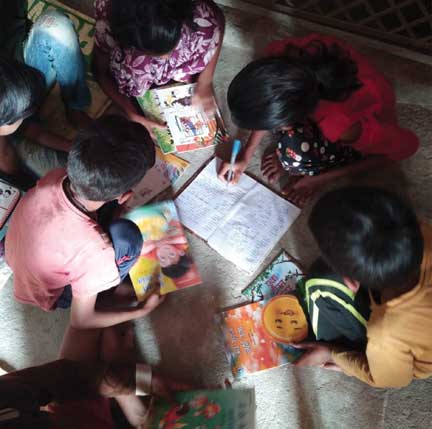Yogesh Kawadkar
(Translated by Nivedita V.Bedadur)
My work as an assistant (Guest teacher) in this government school at Pandoni (Dhana)1 is not what I imagined my life would be. But I am thankful for this assignment. Yet as I come to terms with my position and work with the children, I begin to get involved and enthused. And then, what keeps me going is my visit to Bookworm, Goa2. I take in every word of my Library Workshop3, day by day, page by page and book by book.
20 Dec, 2018
In the library workshop, many educators are shaping my vision of the role of libraries in education. This vision is now transforming into a burning mission. I now understand that education is not about filling the pot or lighting the lamp. It is about developing critical, empathetic and reflective thinkers and doers. How does one do this? I have begun to understand how libraries and children’s engagement with books at a very early stage are foundational to this engagement.

2 Jan, 2019
A library in a government school
I have seen that in most schools, libraries are dingy rooms with dusty cupboards. There is no dedicated library educator. Usually, assistant teachers are given additional charge of the library. Before the library workshop, I handled this troublesome charge like any other teacher. I issued books and monitored returns. But now my mind is churning with ideas of bringing books to children and children to books.
10 Jan 2019
A mission germinates
A mission has begun to germinate in my mind. I now visualize myself as a library educator. My role, my space, my vision have begun to take shape. I know that I want to bring the joy of reading to the community and create pathways for engagement with books.
5 Feb 2019
Children and books
I am so happy. Finally, I have begun a book discussion with the children. I wonder what children know about books? Which books have children been reading? I asked them, if there were no books in their lives, then what would happen? Children have interesting thoughts to share:
We wouldn’t be able to write.
We would not learn standard languages.
We would not understand history.
We would believe in ‘bhondubabas’*.
We wouldn’t know about discoveries and inventions.
We wouldn’t be able to do accounts.
Our country would not progress.
We wouldn’t know the languages and cultures of other nations.
We would discriminate on the basis of caste.
We wouldn’t know our rights, our constitution…
I am touched by their responses…
I think I will open the cupboards, dust the books and distribute them to groups of children. As they read the books, I will introduce them to genres and categories, e.g.,what books are these? – stories, biographies etc.
26 Feb 2019
Doing a read aloud: The Good Mother
Before beginning I ask the children to predict the story. Children make some interesting guesses.
While reading, I read the first page and asked the children, ‘Where do you think Rakesh’s mother is? I follow up with more prediction questions. Children answer the questions with enthusiasm and confirm or question their prediction after each page. In their minds they are engaging with the stories!
Post reading: I ask the children, “What do you do in the afternoons? Do you help your mother? How? Do your parents give you … How will you become good children?”
What an engaging discussion we had, and then suddenly I had a thought, “Why don’t you write ‘your’ story?”
27 Feb 2019
Children’s stories
Children are writing their own stories and connecting what they read with their lives. They are writing about the issues in their lives. This experience has made me rich. I have begun to peep into the life of my community.
Mar 2019
Challenges during read aloud
I have begun to realize that only some children are vocal during the readaloud. I am helping them understand and supporting them in listening to others. Many children have poor vocabulary. I am now reading many other stories: Mithai, Tota, and Gunjan. Slowly children are engaging with books. They are asking for books.
2 Apr 2019
The library team
Can one ask for more! Children come to me with a proposal for a library team. I opened the library cupboard and they are looking through the books. They are tallying them with earlier records.
15 Apr 2019
New collections
I entered the school armed with new books brought back from Bookworm Library, Goa. Immediately children have started recording them. Children are curious, they ask me, “Are there other types of books too?” They are often stumped when a book does not fit into their genre classifications. I am planning more read alouds and book talks in different genres.
3 Jul 2019
Books take a walk in the school
Throughout I was skeptical about children’s access to books in a library, even if the books are organized and openly accessible. For some children, entering the room would be difficult. So, I have thought of bringing the books out of the library. I have begun hanging little clotheslines and have found pegs which will help me hang out the books in a gay, colourful manner, within reach of children! Now even the younger ones can reach and touch the books. I am getting a lot of help from my colleagues in my endeavour!
6 Jul 2019
Books conquer the village
What a day! I entered the school and found the library team near the principal’s office. They had been promised the treasure of books that had been stored in the primary school! We organized the books, on the lowest rung were the books for little ones, while on the higher rungs were books for older children. All this in preparation for the deluge of village children borrowing the books!
10 Jul 2019
Book buddies
My children’s library team is worried. They animatedly discuss, “Do the children who borrow books really read them? What should we do to ensure that they read?” Children are creating a register in which they encourage those who are returning books to write their names, theme of the book, characters, and the summary of the story. The younger ones need help, so we have selected book buddies to help them with browsing, selecting, issuing and filling up the library cards. And we also encourage them to respond to the books by drawing!
15 Jul 2019
Challenges of a growing library
Some time ago, children said that the existing books in the library were not enough! What about a magazine for children, something that comes every month, that brings new stories! Children decided that they would collect a library fund which would provide for magazines and new books. Everybody will contribute at least two rupees.
I asked principal sir if there was provision for funds for the library in the school budget. He regretted that the dedicated fund for school libraries has been discontinued by the government.
When a library has immediate and tangible returns in terms of children’s learning, when the goal of all learning is to nurture thinking and creating beings who have empathy and respect for diversity, and books can bring all this closer to reality, why, oh! why would there be no provision for the library and its sustenance!
Aug 2019
Children write their own stories
As I enter the library, a little girl shyly shows me her notebook. She has written a story in response to the last book talk. This was the first story that emerged out of the library experience, The Woodcutter’s Realization – In the little girl’s story, the woodcutter desists from destroying the jungle unlike the reality that she saw in the village every day. She is now drawing pictures for the story, actually story boarding it.
After the first story, children began to write in troves: Save Trees Plant Trees, Harmony in the Village, Water is Life, To the Market, Teach the Girl Child, Save Animals, Village Deepawali, Raju’s Son is a Doctor, Wise Use of Water. Yes, the children are thinking of social issues in the village! The discussions and selection of books are doing their magic!
Sep 2019
Library team in action!
The library team has begun to do read alouds and book talks with primary school children. They are doing many activities for developing their interest in reading. They are now planning weekly painting, craft, clay projects. And in the Bal Sabha, they are organizing debates and discussions around books.

Sep 2019
Children’s writing in print
I was wondering what to do with the children’s stories, so many of them, and Sujata* suggested that I could send the children’s stories for publication to Eklavya, and other journals. I sent some stories to Palakneeti. And lo and behold, they accepted one of them, Harmony in the Village for publication. This little author, Tejaswini and her friends are ecstatic with joy.
Oct 2019
A school celebrates
The journal has arrived! With a book for the little author and a charming letter. It is the first time that our Pendoni School has a publication to its name! And Dainik Bhaskar has published a feature about Tejeswini and the whole library team. A tiny library, a small school, an unknown village are now famous! Principal sir is so happy, his phone does not stop ringing! We have a celebration in the school assembly. Principal sir honours the library team. The cluster principal sends his congratulatory note and blessings. The story, Harmony in the Village is a true story; the child has written about her own experiences.

Jun 2020
Lockdown library
Schools are closed all over India. We have been asked to stay at home. I haven’t been to the school or met the children in the past three lockdowns. Today we got a little window and could go to school. Principal sir and I entered the school – and we were surprised – our library team – has kept the ‘Innovative Library’ open! Children explain that they have kept the library open every Monday of the Lockdown.
When I check the records, I am surprised that the library leader has taken 19 books home, read them and exchanged them.

July 2020
The living library
The entire nation goes under lockdown! Corona virus has struck! Fear rules! Everything has closed down, locked and sealed. There is no one on the roads, no shops open.
Yet the library is on, through the children, quiet exchanges happen, animated conversations emerge about a well-loved book, a favourite story. Children are taking turns to collect a set of books from the library, go around by themselves, distribute and exchange books at home.
Yet the reach of the books is only within a few kilometers. Books have not reached children from Pendoni Dhana. I decide to take up this part of the children’s effort and reach beyond the borders where children couldn’t reach. I deliver story books along with textbooks. Parents now complain that children are reading the storybooks much more than their textbooks!
Still, I worry that only a few children are reaping the benefit of this living library. Those living in the margins of the village and beyond are still in the dark. These children need the library the most. It is books which help children to expand their horizons, give wings to their imagination. In the villages, children collect information from the television and mobile, but their lives remain cocooned in their restricted experience.
Schools in cities and towns, schools which serve the privileged have managed to open tiny little windows to learning as well as libraries to children. But in the villages, there is poor network and very few parents have smart phones. Parents beyond a certain perimeter of the village, cannot send children to the library, especially when part of the school is a COVID center. Younger children living far beyond find it difficult to walk down to the school. Despite these issues, children have managed to bring alive the world of books to others, in the absence of walls and cupboards, boards and registers, the library has become a living, pulsating heart full of love and joy in these trying times.
- Pandoni village is located in Pandhurna Tehsil of Chhindwara district in Madhya Pradesh, India. It is situated 24km from the sub-district headquarter Pandhurna and 124km away from district headquarter Chhindwara. The total geographical area of village is 1585.13 hectares. Pandoni has a total population of 1,704. There are about 379 houses here. Pandhurna is nearest town and is approximately 24km away.
- Bookworm Library began in September 2005 in Panaji, Goa with the thought of creating a rich accessible collection of children’s books.
- The Library Workshop is part of the field engagement for Wipro Fellows.
Yogesh Kawadkar is a library educator maintaining, enriching and nurturing a love of books amongst children. Heis a science enthusiast and is a teacher volunteer at Pratyaya Edu Research Laboratory. He regularly writes for Teachers of India. He can be reached at yogeshkawadkar10@gmail.com.
Nivedita Bedadur works with marginalized children in different locations by volunteering or consulting with organizations like Read A Story and Care India. She is a Visiting Faculty at Azim Premji University and works in the areas of curriculum development, text book writing and assessment. She can be reached at nitavbedadur@gmail.com.
